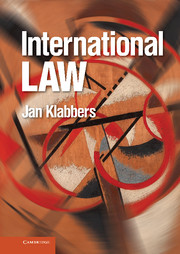Book contents
- Frontmatter
- Contents
- Detailed table of contents
- Table of cases
- Preface
- List of abbreviations
- Part I The structure of international law
- 1 The setting of international law
- 2 The making of international law
- 3 The law of treaties
- 4 The subjects of international law
- 5 Jurisdiction, powers and immunities
- 6 The individual in international law
- 7 The law of responsibility
- 8 International courts and tribunals
- 9 Sanctions, countermeasures and collective security
- Part II The substance of international law
- Part III The surroundings of international law
- Bibliography
- Index
- References
2 - The making of international law
from Part I - The structure of international law
- Frontmatter
- Contents
- Detailed table of contents
- Table of cases
- Preface
- List of abbreviations
- Part I The structure of international law
- 1 The setting of international law
- 2 The making of international law
- 3 The law of treaties
- 4 The subjects of international law
- 5 Jurisdiction, powers and immunities
- 6 The individual in international law
- 7 The law of responsibility
- 8 International courts and tribunals
- 9 Sanctions, countermeasures and collective security
- Part II The substance of international law
- Part III The surroundings of international law
- Bibliography
- Index
- References
Summary
INTRODUCTION
International law, so many claim, is predominantly made by states, and this still holds true in large measure. Since states are considered to be sovereign, it follows that there is no authority above them; and if there is no authority above them, it follows that law can only be made with their consent – otherwise the system would be authoritarian. Hence, international law is often said to be a consent-based (or consensual) system.
International law does not have a specific document specifying how it is made; there is no treaty on the correct ways and processes for making international law. Instead, the Statute of the ICJ contains a listing of instruments that the Court may apply in deciding cases, and it is this listing that is often used as a starting point for a discussion of the sources of the law. This already suggests that the list is not exhaustive; it is possible that there are sources of law not mentioned in article 38 Statute ICJ. And indeed, recalling that the same list already graced the Statute of the PCIJ and was drafted in the early 1920s, it seems eminently plausible that in the years since then, the possibilities for law-making have expanded. It is plausible to say that international organizations can make law, although one can also explain their resolutions as being treaty based, since the authority of such resolutions derives from the constitutive instrument of the organization. There is widespread discussion (if little truly conclusive) about the role of civil society and non-governmental organizations (NGOs) in the making of international law. And there are heated debates about whether states can make so-called ‘soft law’, and whether law can (and should be allowed to) arise through networks of civil servants and regulators.
- Type
- Chapter
- Information
- International Law , pp. 21 - 40Publisher: Cambridge University PressPrint publication year: 2013



